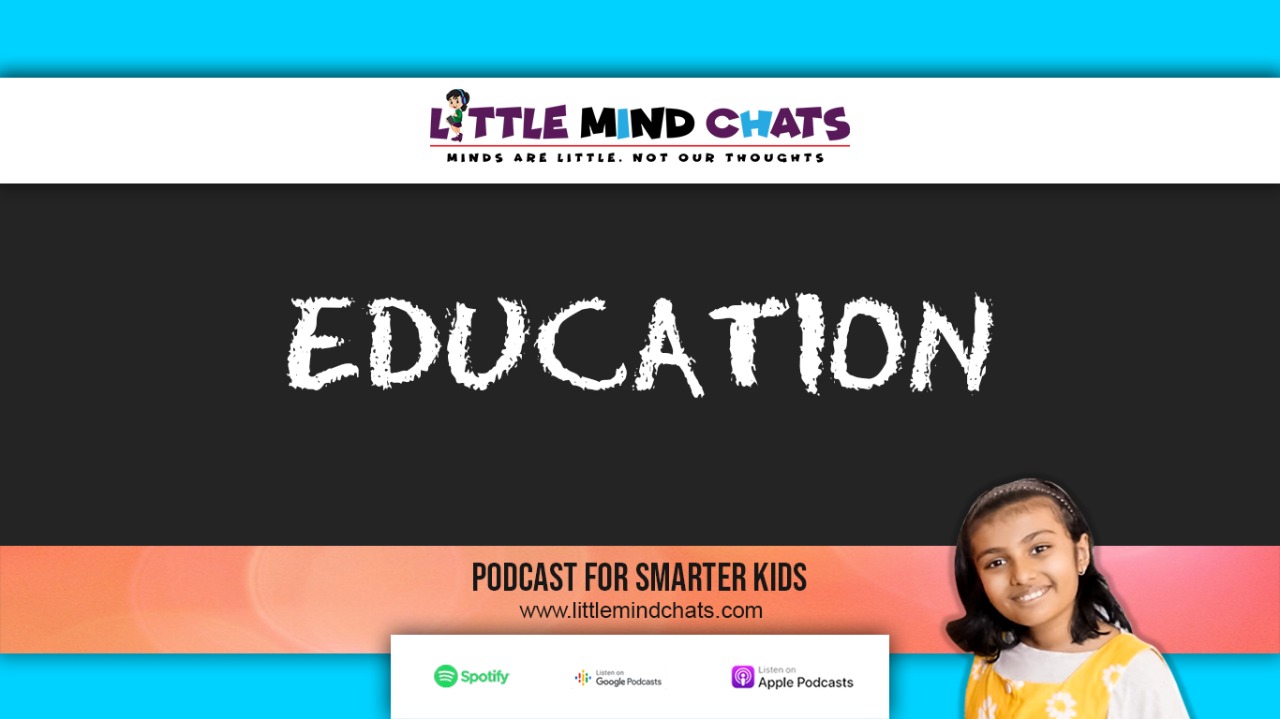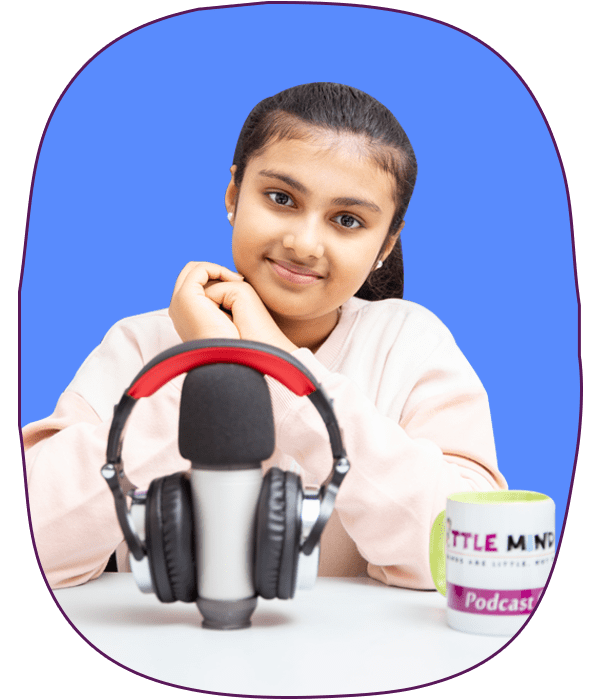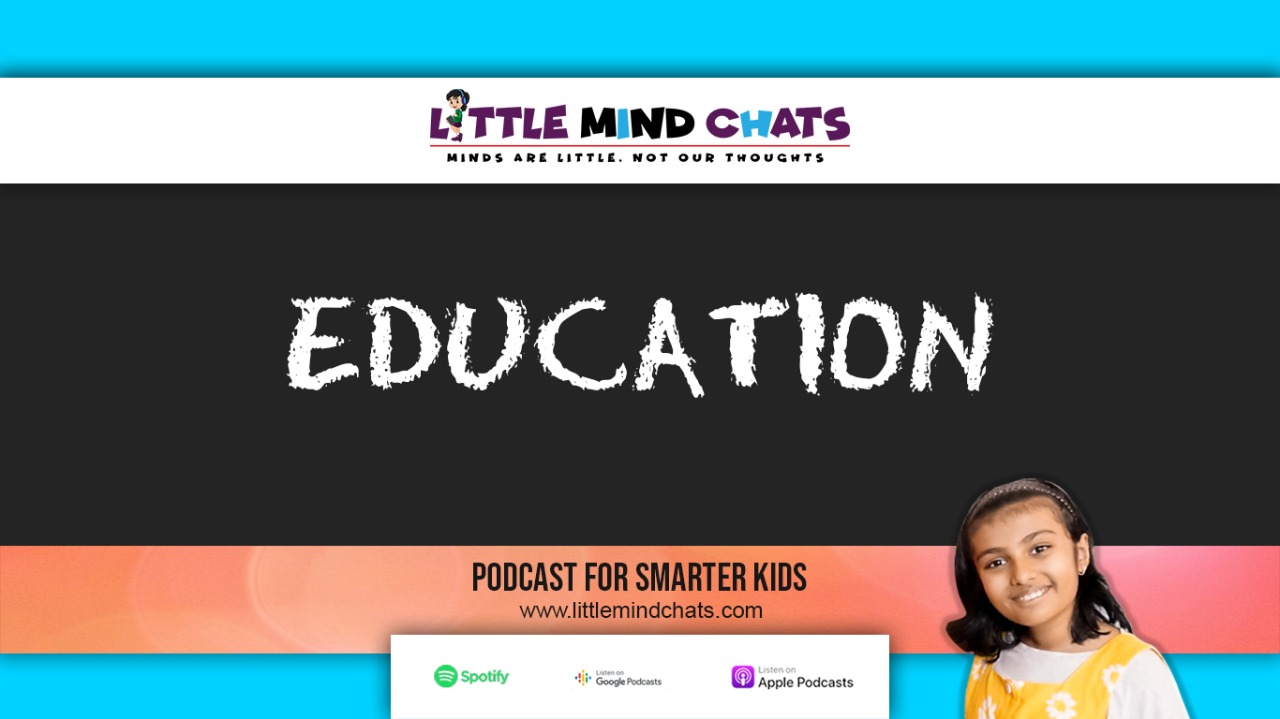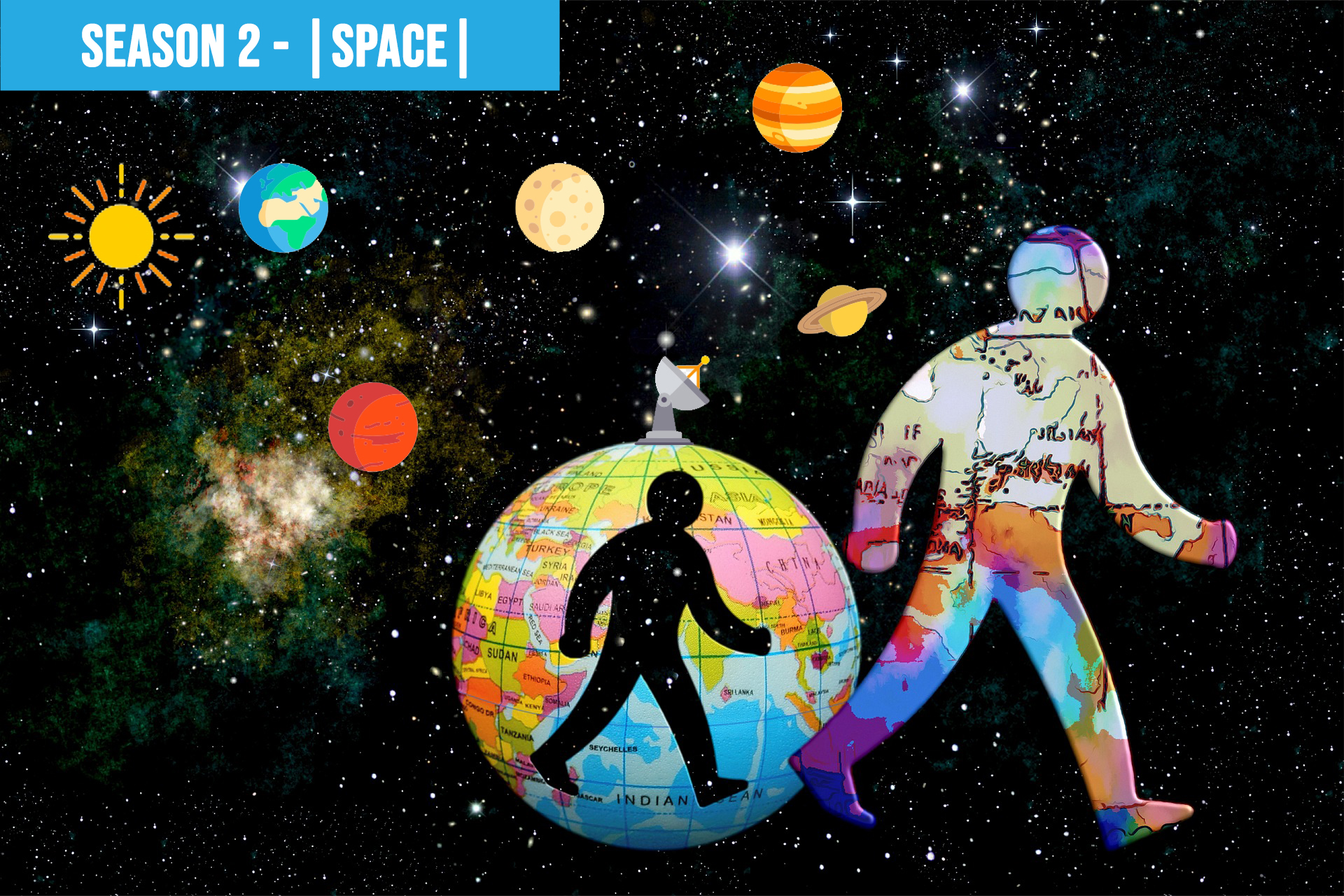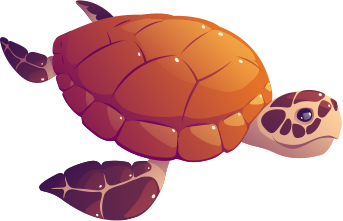045: Future of Education (NEP 2020) – Part 1
Transcripts
SEASON-3
EPISODE-045 FUTURE OF EDUCATION (NEP 2020)- PART1
[0.01] {Background Music}
[0.08] Siyona: Hello, hello. Welcome back to my podcast, Little Mind Chats. Minds are little, not our thoughts. I’m your host Siyona.
[0.16] In our Season 3 – Education, we have so far seen many aspects of Education. But what is the future of Education itself? Would it be any different? Are we likely to see any changes?
[If you’ve heard my previous Episode with Mrs Aparna Dinesh, she did mention something about NEP, the National Education Policy. err National…. What?? Ha haa…. Yeah… that was my reaction too. I was surprised there’s going to be a huge lot of changes to the way we get educated in the future. So, as usual, what do we do when we have questions?? We ASK some experts.
[1.03] Today, I have Dr Chetan B Singai with me in the studio. He is currently working as Deputy Director, Ramaiah Public Policy Centre (RPPC), and as Associate Professor, Ramaiah University of Applied Sciences, Bengaluru. He obtained his PhD from Indian Institute of Science Bengaluru and was even awarded Social Justice Medal by the Ministry of Law and Justice, Government of India for his service towards Human Rights and Women Empowerment by the Hon’ble Chief Justice of India in 2007.
[1.47] So, what does he have to do with the today’s topic you might ask? He was associated with the Committee to Draft the National Education Policy between 2017-2019 in the Ministry of Human Resource Development, Government of India, New Delhi as a Chief consultant.
[2.12] Boy! Am I proud to have him here? I certainly am. Welcome to my show Dr Chetan. How are you doing today?
[2.22] Dr. Chetan: So, hi Siyona. I’m good. Thank you. So, I look forward to interact a session with you in terms of enlightening our little minds who are listening to you. Thank you.
[2.34] Siyona: You’re welcome and thank you. Let’s give it a start. My first question is,” what do you think is wrong with our current education system?”
[2.45] Dr. Chetan: Well the current education system is teacher centred. It has to be learner centred. Right? So, we have to put learning into our day to day activities and make learning joyful and something which is burdensome on our mind. Our children should enjoy going to school. Not make complaints that, “I’m not well”, “I don’t like going school”, “It’s raining very heavily” …
[3.13] Siyona: (chuckles)
[3.14] Dr. Chetan: They should be feeling that energy and joy to go to school. That’s the first thing I would say. To do that what we should do. Number one, teachers should become friends and school should become home. And class room should become our study rooms or what we call the home that we have or experience. So I think that is what we need to do and the National Education Policy 2020, sets an important agenda for that. And lastly, in school education, what I feel is that our curriculum has become very memory based or route learning based. Right? So, extra-curricular and co-curricular activities are often seen at least in India, as an additional or value add to curricular. But that system has to change. How? We should see everything as curricular, extra-curricular, co-curricular. So, what happens if we see everything as curricular? Parents and the child both will feel the importance of understanding this exercise as you know, coming together for a particular cause. That is making learning joyful and enjoyable. Right? So, that is what I would say are the two important things that need to be corrected. And it’s a right time with the 21st century coming in, we are able to have a new system of education.
[4.42] Siyona: Hhmm. That’s a very good point and also. Well, one of my teachers is exactly like that. She once said that, “even though you don’t have any friends, I’ll be your friend”. So, we always look forward to English class.
[4.59] Dr. Chetan: Yeah. Why?
[5.01] Siyona: Because, our teacher, she is, she appreciates nearly everything.
[5.06] Dr. Chetan: Mmm.
[5.07] Siyona: And she allows us to take our time and show what we have been doing in this lock down time.
[5.16] Dr. Chetan: That’s so nice. So, that’s what I’m looking forward for. Like, every teacher takes the ownership of being a friend with each child who’s coming to her or him for education learning.
[5.30] Siyona: Yeah. Moving on to my next question, “Can you give us a little understanding about NEP 2020?”
[5.39] Dr. Chetan: The NEP 2020 which is also very popular today among all the teachers, students at every level right from early childhood education that is age of 3 to lifelong learning. It’s also known as learning from cradle to grave. The National Education Policy is a document which is not only for today, but also for the next 30 to 40 years. What education should be in 2040, 2020 and 2025 and so on so forth. So, after a period of 35 to 36 years, we’re having a National Education Policy. In that, the school education is a very important component. Unlike the previous National policies on education, that is 1986 was the last one. Earlier, education was seen as compartment, school education, higher secondary education, then higher education. But in this document, National Education Policy 2020, education is seen as a continuum. Right, whatever happens at the primary education, that is elementary education would have a deep and broad impact on the higher education. For instance, we talk about having multi-disciplinary meaning that a child or a student or a learner should not only know about science but also know about history. Also know about technology and we expect that to happen in college and university for research. But in NEP 2020, it says by the grade of 8th or 9th that multi-disciplinary should come in. whether that student has lot of flexibility and choice to learn to engage. Secondly, practical learning or what we call hand on learning. For example, “would you enjoy making pottery in a school?”
[7.35] Siyona: Hmm. Yeah. Very much.
[7.37] Dr. Chetan: “And would you enjoy having a kitchen garden, making your own garden on school, campus?”
[7.42] Siyona: Oh yes. That would be so fun. That would be my interest.
[7.45] Dr. Chetan: So, that is what NEP talks about. How to make learning joyful by bringing in these hands-on learning. And something that you would learn something for life. Not for the sake of learning. How much of mathematics do we remember after our 10th grade? As you said we only remember good teachers and some good memories. But why do we tend to forget on page 34 of English textbook what we had? Because we are not enjoying learning. It’s imposed on us. So, National Educational Policy brings in that component of learning by doing. Right? Thirdly, it has a new structure which has been proposed. Currently, what we have is a model which is called 10+2 model. 10years of school education and 2years of college education also known as 11th and 12th grade. Now NEP says we need to break that structure into 4 parts. Right? That is from the age of 3 to 6, infant, what would they do? How would they learn is a very important component, second is the age of 8 to 11, That is, class or grade 3 to 5, third is the age of 11 to 14 that is, class 6 to 8. And then fourth is the age of 14 to 18. So, from a child to an adult, this is a structure. But in the earlier system, that is what we are practicing today, we lose out on this you know connections of how a child is evolving into an adult and then how that adult moves into higher education. So, all of this is a new system in order to ensure effective pedagogy for teachers as well as curricular structure for students or learners which I say. So, I think this is a major shift which we are seeing in the National Education Policy. And lastly, teacher training. So very often our teachers are trained on regular basis even once in a year, twice in a year or so and so forth. But sensitising them for this new structure which a new approach, it’s going to be a revolutionary change. Because having teachers to ask them to help children to do pottery overnight, it’s not possible. Because, the training for teachers has been structured. What you call topped out. They’ve been told to do this; they will do that. But the point is how are we going to change their mind set. I’m talking about majority of the teachers not minority or the few who are already doing it. That I think are the 3,4 important points that I would flag for school education.
[10.27] Siyona: Yeah. I agree, it’ll be so much more fun with hands-on activities. Rather than sit at one place and write your normal note which can sometimes get boring. Okay. My next question is, “As children, what are the major changes we will see in our schools and classrooms?”
[10.46] Dr. Chetan: Well there are two types of reasons for which we could see changes. So, one is the policy itself which would eventually, you know bring that change or it could be simple mindset and attitudinal changes of the teachers. So, let me talk on the policy perspective. First as I mentioned that design of learning friendly environment within classrooms is very, very important and I may talk about it, see when we see the Bangalore, schools in Bengaluru or some of the big cities, they look very nice. But when I really go to the rural areas which are the villages what we call the anganwadis which cater to the maximum number of children, they are very much in bad shape. We never know when they will collapse. We never know how food is supplied, how hygienic is the food. In that environment a child learning is next to impossible. So that is another important thing that how do we convert those anganwadis which are basically schools for children who are in the age group of 3 to 6. That is anganwadi in the rural areas. There are no qualified teachers. There are no trained teachers. So how are they going to engage? Learning at that age is very critical. So, if there is no guidance, if there is not facilitation there, then it is going to be a major impact that is going to happen to these children. So that I think creating a learning friendly environment at these preschools or anganwadis is a first thing which is going to be a major change and in fact the policy talks about it. Then the scope of the curriculum. Right? As I said, if you really want to bring hands on education, vocational education. Right? Exposing the learner at that young age to a certain vocation of carpenting let’s say. So that means the curriculum has to change and that is another thing which is going to be a major change that we see in school and classrooms and education. Then third is professionalization of quality educators. What I mean by this is as I said earlier, the training programmes are building capacity of the teacher that is how to teach, how to use smart boards, how to give as you said home works and all those things. But the attitudinal change. How do you become sensitive to needs of each learner, not all learners, because the needs of each learner or a child is different, how are you going to sensitize yourself? Those kind of psychological, counselling set of skills are very important and that has to become part of school education. Then fourth one I feel is with regard to foundational literacy and numeracy from the level of elementary schooling. So, what we see today is as I said topped down. I give the syllabus, I give the curriculum, you supposed to do it. But it has to be bottom up. We need to assess the need of the learner and then develop the curriculum for each one of them. I think that flexibility is not there today in schools and curriculum that has to be brought in and that NEP talks about bringing that into the school. The last point is very interesting. We have a program called mid-day meal scheme. Have you seen those Akshaya Patra vans moving around in the city? I am sure you are new to city. But, if not there is a vehicle which goes to each school to deliver food. To whom? To the government schools, schools which are run by the government. Right? What we see, nice jazzy schools or private schools. Right? Because those who can afford it, those who can pay higher fee for that. But these schools are many because they cater to the maximum. Like the anganwadis we have government schools. Now that is another change which is coming in schools. Because, these mid-day meals, meals once in a day that is the mid of the day, sometimes it becomes a reason for children to come to school. Because children at least they get one meal, some nutrition. But now NEP says we need to have breakfast also mandatory. So, it means that the time they are going to spend in school is going to be larger. Because they will have breakfast and then mid-day meal. So, from morning to afternoon they will be with the teacher or joyful environment. So that is another major change that I see which is coming in a big way in the school education. So, I think more or less what I am sharing is from the schools which are most critically affected. Especially in the rural areas or the villages which are our focus points. But urban areas like Bengaluru I think there is lot of new changes which are already been adopted by the school themselves or by the policy itself eventually. That’s I think our major shifts that I see in the school education and classrooms changing.
[15.30] Siyona: Mmm. Yeah. Well in UK, we had like a small like of our own we were doing a project on super heroes then. When I was in second grade. We had to make super heroes of own and I was.
[15.45] Dr. Chetan: Wow.
[15.46] Siyona: And at that age I was thinking that I was a super hero myself.
[15.49] Dr. Chetan: Okay.
[15.50] Siyona: So, we had to design our own superhero belt, so we took a log of wood, we bought it to the playground and we used the saw to cut the wood into small pieces and after that, we took it inside used our tips and drew our super hero logos.
[16.12] Dr. Chetan: Wow. What was your logo look like? What it did it look like?
[16.15] Siyona: Ah, a turtle.
[16.16] Dr. Chetan: Turtle. Okay. That’s so interesting.
[16.18] Siyona: I thought I was a turtle girl. The fairy of all turtles.
[16.20] Dr. Chetan: Okay. Wonderful. Much needed. Yeah. Lot of turtles are not being conserved. We see them being killed by various people in the Orissa region especially we see that. Some of their nice turtles which are missing out, extinctic turtles hardly. India is known for it actually. Yeah. So good. You have lot of things which are interesting and exciting.
[16.27] Siyona: Yeah. But then, I was like why only turtles? There are other that need that love and devotion from humans so I moved on my love to zoology and biology.
[16.55] Dr. Chetan: Yeah. So, you are a case study for the NEP 2020. See you’ve learnt that thinking from your experience beyond the classroom. Then you want to now look to your career towards your future based on that experience which has remained with you for so long and so deep. Right? So that’s what is required in the country and that is what is the policy also in this urge. Right?
[17.22] Siyona: Well, my next question is, “would we still have all these, exams and endless homework? It’s pretty demotivating sometimes.”
[17.33] Dr. Chetan: Well exams have been always the case, you know in terms of either they are very scary or they are demotivating or it becomes a very competitive kind of you know, experience among children. I understand. But see when we have such a large population and we have to have some sort of assessment in order to you know progress from one grade to other grade. And also, the competition which is evolved in. Assessments or exams would be still relevant and still continue and what I’d suggest is, what changes we are seeing with the policy is the focus on incremental assessment. Not on the summative. That is what you learn after end of a year. But that shift has to happen and that is what is now gradually coming in higher education we have already moved so that whole pressure on the learner or a child end of the year must be reduced. So, I think examinations are important. What need to be changing is the type assessment. But of course, it should not create that pressure in the end of the year where we just mug up you know and then by heart as you know. Some children here tend to do and end of the year they just go write the exam and come back. It should be cumulative not summative.
[18.52] Siyona: So, what exactly is the cumulative and summative?
[18.55] Dr. Chetan: Yeah. Summative is that once in a year you write an exam and prove that you are capable of completing the grade. Right? Summative, so you sum up the entire experience and then you write an exam that is usually here we have a 100-mark exam where you score some marks out of the preparation that you have done. Cumulative is, it’s a gradual incremental process, that is every two months three months you will have some tests. Small tests which are not so scary. They are basically as I said hands on or it could be based on your practical learning or it could be based on experiments that you do. So, it’s more like you know closer to the learner and the learning rather than testing your memory compound and that is what the difference between summative and cumulative is. So, cumulative is a good way forward.
[19.47] Siyona: Yeah well once Einstein said, “you can’t tell a fish to climb a tree, and when he doesn’t, he’ll live the rest of his life thinking he is stupid”.
[19.57] Dr. Chetan: Yes.
[19.58] Siyona: So, different children’s since we have different capabilities, they should be given different tests.
[20.05] Dr. Chetan: Yes. I think that’s what is what is important to differentiate between testing the content versus testing the competency. Right? So, when we test it on hands on or test it on this kind of you know learning by doing, they are testing the competencies. Competencies are about your capacity and capability to do something which is very different from what another person would do. Right? So, testing the competencies is the cumulative part. Testing the content, that is the text book content that you read, you know memorize, you know all those things is the summative part. So, I think we need to shift from the summative or testing the content to testing the competences. To test the competences hands on, activity based, assessment is the way forward. And that is what is what critical for our education or especially school education so that we can get a better set of graduates coming to higher education.
[21.03] Siyona: Yeah. “I heard NEP would mean that we’ll be instructed in local language until grade 8. Is this true?”
[21.11] Dr. Chetan: Yes. It’s very much true. But let me also explain the myth that is surrounded by that. It is not mandatory or it doesn’t impose any language for the child to learn. In fact, it provides an option. If you read the text very carefully and those who are confused about it, I would urge you to read it. That is, it says mother tongue or regional language or English. It’s not a mandate that it is mother tongue and regional language and English. It an ‘OR’. So, it’s the respective government now to provide resources where in they can have schools offering all the three as a medium of instruction. Right? So, your science text book could be in… let’s say in Karnataka the state language or the regional language could be Kannada. But there are also families who are coming from other state in Bengaluru. Right? So, they could opt for English. Because many places we see English as a mother tongue today. The new mother tongue is evolving that is what you call family language. So, that option is very much there in the policy. It is not an imposition. And as a result of that, NEP 2020 recommends that we have multi lingual or bilingual text books. Right? So, we also have that you know most of the higher education entrance tests are bilingual. You’ll have a question paper in English and as well as in Hindi as a national language. So, I think confusion here is that, it is not an imposition of one or other. It is an option to the school and the teachers and the student or the learner to opt for either mother tongue-based education or medium of instruction or it could be regional language or it could be English. So, it could be again English, back to English as the choice of language for the child. For, as a medium of instruction. So, text book would be both in their respective language, regional language as well as in the English and the mother tongue. So, that is based on the demand. So, schools will have to decide now based on the resources how would they want to organise. Whether they would like to offer two of three which have been recommended or all the three. But definitely not only one. They have to choose either two, because there is an option. That’s what is called flexibility in school education or they could offer all the three depending on the resources. That’s the whole point of this local language. When we say local language, it is all the three. Right? Mother tongue, regional language and English. Yeah.
[23.46] Siyona: Okay. Well, that is the good thing because I have classmates hailing in from Orissa and other places and they might not understand like my mother tongue Kannada. If their text books were also in their mother tongue, they would feel more comfortable to learn in the language.
[24.10] Dr. Chetan: Yeah. In fact, let me also tell you a scientific insight here. In the domain of neuro science, the science which studies our nervous system and also our brain and its functioning and the whole process of learning new things, language is one such thing that child learns very much at the age of 3. What is the first language that they’ll learn? They’ll learn the mother tongue. Right? Do you see your brother when he was 3years old he…
[24.39] Siyona: He is three years old.
[24.40] Dr. Chetan: He is three years old. Now, what language he speaks at home comfortably?
[24.44] Siyona: He speaks both Kannada and English.
[24.47] Dr. Chetan: Yes. But what are first thing he spoke? Kannada or English?
[24.50] Siyona: English.
[24.51] Dr. Chetan: English. Because you’re all speaking English at home. Right?
[24.54] Siyona: Yeah. Sometimes it’s Kannada. Sometimes it’s English. Like a mix of both.
[24.57] Dr. Chetan: Yeah. But who taught him both the language? Was it a teacher?
[25.01] Siyona: No.
[25.02] Dr. Chetan: or was he self-taught?
[25.03] Siyona: He was self-taught. He just like watched us in our conversation.
[25.07] Dr. Chetan: Yes.
[25.08] Siyona: And like decoded the conversations and used those words in his conversations.
[25.13] Dr. Chetan: And that would remain for life. Right? So, the power of mother tongue or the language, which ever is comfortable, so you’re necessarily always a mother tongue is a comfortable language. Depending on where you are. So, when you’re in UK you in a different environment and when you’re back home, you’re in a different environment depending on that. So, but learning in a language which you’re comfortable in makes a lot of difference because almost the learning techniques of the cognitive mind or the brain picks up language which we are most comfortable in and most close to passionately close to it. So why not give that experience instead of imposing a child to learn something which he or she is resisting. Why not give something which they enjoy? Right. And easily absorbed in to learning skills capacity. Isn’t it? So that’s what I was saying. So, when we say NEP talks about learning in mother tongue for the cause of the learner, no other hidden agenda. Right? So that’s what we need to value.
[26.14] Siyona: Well. We are far from done with our questions on this topic. The future of education here in India sure seems very exciting. We will continue in our next episode. I hope you’ve been able to listen to my new year’s episode. I had explained that we’d have a question at the end of each episode. If you could answer this simple question, you’d get a chance to be in our monthly lucky draw. Here you go. My question for this week is, “What is cumulative and summative way of exams?” (repeats). You’ve just heard the answer to question right here in this episode. Please do send in your answers to siyona@littlemindchats.com. Please do follow me on Facebook, Instagram, Twitter and LinkedIn and share my podcast with your contacts. Thanks a ton for listening! Bye.
Other Interesting Episodes
01 Nov-20. by Siyona
034: Importance of Education
29 Oct-20. by Siyona
033: Concluding Season 2/ Welcoming Season
No Comment Found..

